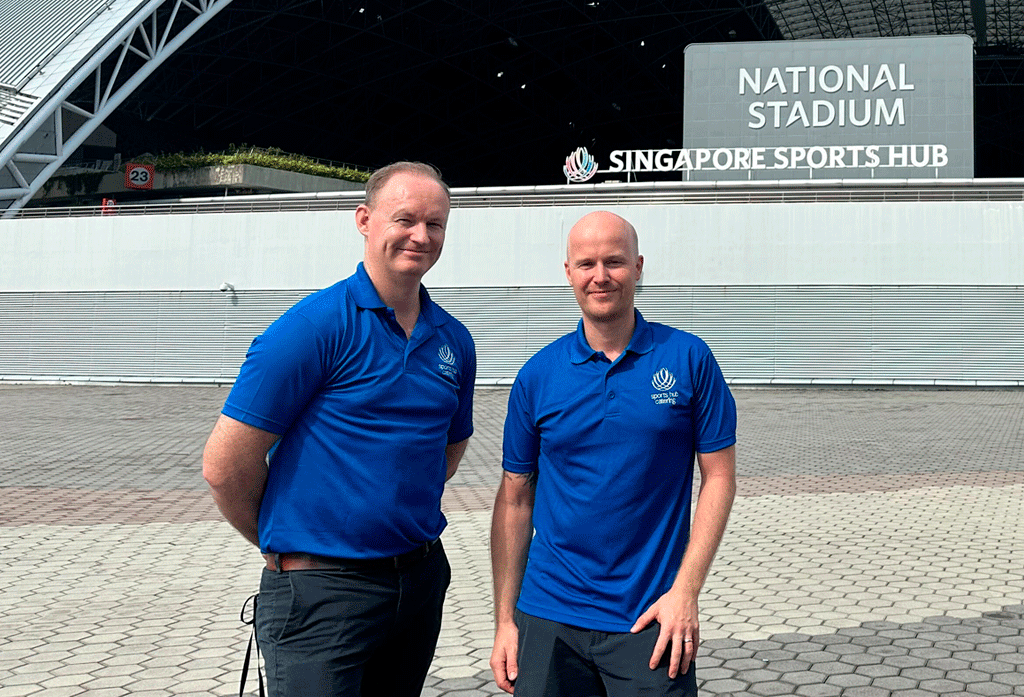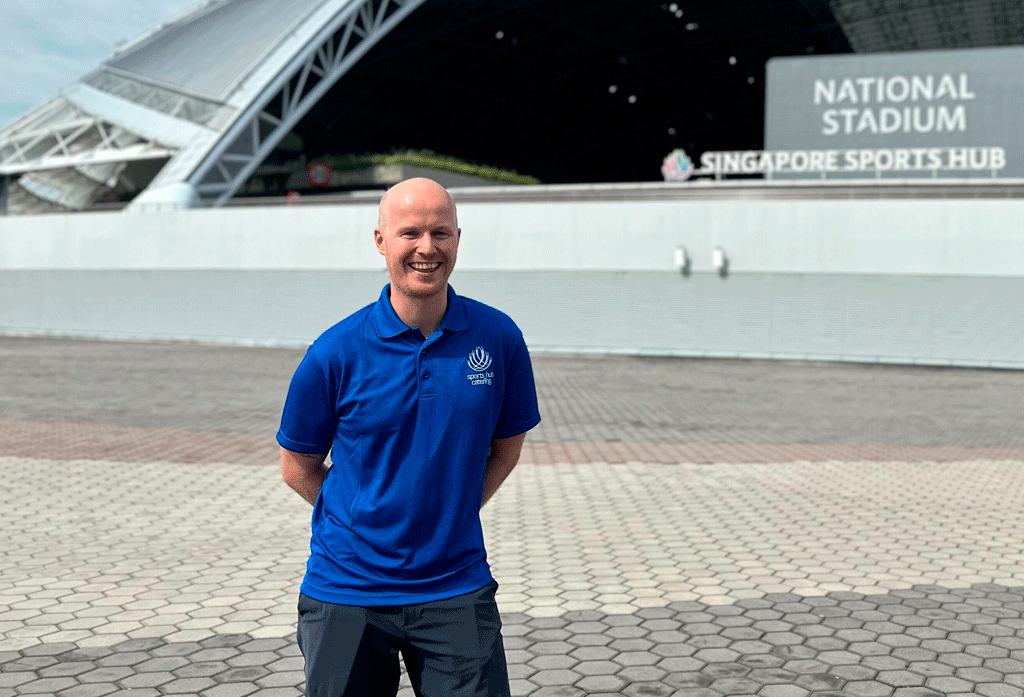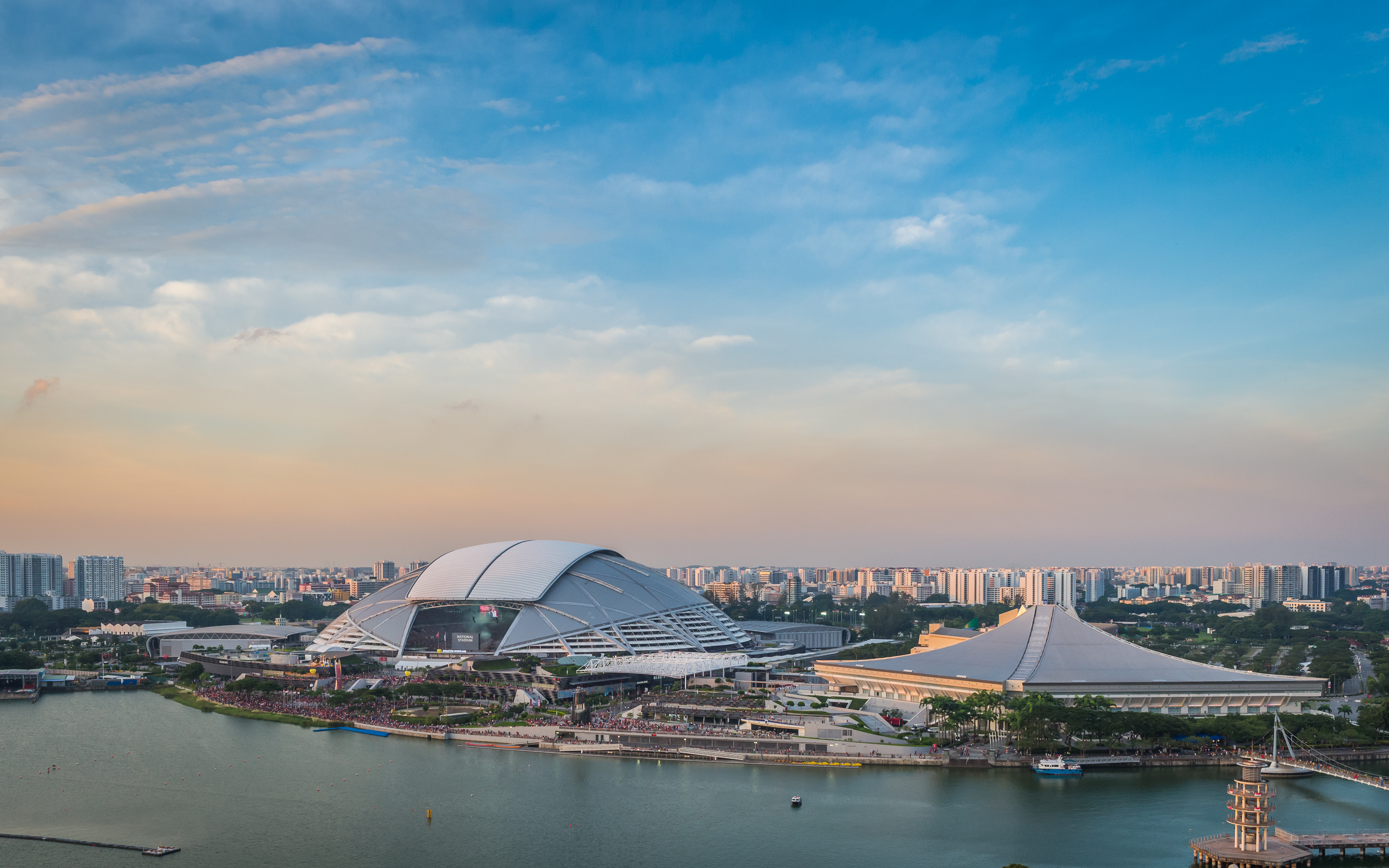Behind the scenes: How SATS powers Singapore Sports Hub Catering and Hospitality
For most of us, a concert or sports event is about the thrill—the roar of a Rugby Sevens crowd, singing your heart out with Coldplay, or even just the joy of holding a pizza slice in one hand and a beer in the other.
But very few of us know the people behind Singapore’s largest venues–the Sports Hub Catering Team (formerly known as SATS Delaware North), a business arm under SATS Food Services. This team, led by Mark Macdonald, General Manager, works closely with the Catering and Hospitality Team at Singapore Sports Hub.
While the Singapore Sports Hub team engages with clients to curate their hospitality experience, Mark and his team complement with their attention to food operations across four major venues: the Singapore National Stadium, Singapore Indoor Stadium, OCBC Aquatic Centre, and OCBC Arena.

(L) Mark Macdonald, General Manager, and (R) Christian Graebner, Executive Chef, Sports Hub Catering
We had the chance to sit down with Mark and Christian to get acquainted with the world of large-scale event catering, from menu planning for thousands of spectators to the controlled chaos of event days.
Sports Hub Catering's network of ‘funtimers’
.jpg?sfvrsn=9ba916df_0)
Sports Hub Catering’s backbone is made up of part-timers, endearingly called ”funtimers”
If you think running Singapore’s National Stadium’s F&B operations means a small army, you’re right. But this army doesn’t come with rigid 9-to-5 routines. Sports Hub Catering’s backbone is made up of part-timers—endearingly called “funtimers.” When asked why they were given this playful title, Mark chuckled, “It was just a name that stuck. It’s casual, just like the job.”
Funtimers at Sports Hub Catering hold various roles during events. They can be chefs, cooks, hospitality servers, concessions crew, logistics runners, or stewards. All food and beverage services at the venue, including retail concessions, corporate suites, members’ dining areas, and function spaces, are handled by the team, so much so that overseeing these operations earns Chef Christian 30,000 steps in one event.
With about 1,000 funtimers in their database, the workforce is a mixed bag of off-duty hotel staff, friends from the hospitality industry, and locals who enjoy the gig for the flexible hours. As one fun timer shared during an event, “You get to catch snippets of Coldplay and Taylor Swift—it’s definitely a perk!”
Mark explained that running a business like this requires creativity, especially in Singapore, where locals prefer full-time jobs. "We don’t have the luxury of students taking part-time shifts, so we build networks. Many of our chefs work on their days off just to help out at events.”
Feeding a big crowd isn’t easy

Executive Chef Christian Graebner brings extensive experience in large-scale event catering from Australia
Handling food for events with over 50,000 spectators means juggling several moving parts—menu planning, logistics, and predicting what people will crave. And not every venue has the infrastructure to make it easy.
“Take the Singapore Indoor Stadium, for example,” said Christian. “We prepare the food in a central kitchen and keep it warm until service through quality holding equipment. In such a setup, precise planning is key and experience paramount.”
Christian’s experience has proven critical. Previously, he led large-scale catering at Marvel Stadium in Melbourne, delivering high-quality dishes to thousands of patrons per game. Bringing that expertise to Singapore, he and the team have scaled operations for Sports Hub’s largest events, working at lightning speed to keep up with hungry crowds.
Menu planning, as it turns out, is an art. They can’t just slap together dishes and hope for the best. “We balance crowd favourites like chicken rice and nasi lemak with fusion items, like Japanese-inspired hotdogs topped with furikake,” Christian said. “It’s about finding food that tastes great and presents well throughout the event.”
It’s about knowing what works
Event catering isn’t just about making delicious food—it’s about understanding what will actually work under the specific conditions of each event. For Mark and Chef Christian, who both honed their skills at Delaware North in Melbourne, this knowledge is grounded in real-world experience managing catering for huge, complex events.
Back at Melbourne & Olympic Parks, one of the busiest event precincts in Australia, Mark and Christian navigated the demands of over 250 events a year—plus the Australian Open, which alone brought in more than 35 separate functions each day. “It was a crash course in handling intense, back-to-back events with different requirements and expectations,” Christian explains. “Mark worked there even longer than I did, which gave him a deeper insight into how to manage the unpredictability of such high-stakes catering.”
Mark recalls the valuable lessons learnt over the years, especially when clients requested food that might not hold up in a buffet setting. One corporate client, for instance, insisted on curry with roti for their VIP suite. “Roti just doesn’t work on a buffet,” he sighed. “It either hardens like a rock or turns soggy in minutes. We suggested naan, but when they wouldn’t budge, we gave them baguettes instead. Surprisingly, they loved it.”
Christian added, “It’s about managing expectations. We know what works through trial and error and guide clients toward tried-and-tested options. That’s something we bring from our days at Delaware North—it’s all about balancing client satisfaction with practical solutions.”
Lessons learnt from the pandemic
Just like many businesses, Sports Hub Catering grappled with difficulties amidst the COVID-19 pandemic. With concerts and sports events halted, they pivoted to an unexpected new role—Project Dorm, which fed migrant workers housed temporarily at the venue. For four months, the team provided three meals a day, learning to adjust menus on the fly.
“We found out the hard way that South Indian curries with chilli powder were drying out the workers’ throats,” Mark shared with a laugh. “We had to alternate between North and South Indian dishes to keep everyone happy.”
“Those were some of the busiest months of my career. People were stuck at home, but we were working 3 AM to 8 PM shifts every day. It was exhausting, but it gave us a sense of purpose,” he reflects.
Destination of choice for sports, entertainment, and lifestyle events

(Photo by Singapore Sports Hub) Singapore's National Stadium, which seats 55,000, features the world's largest free-spanning dome, a retractable roof, and a bowl cooling system
With live events back in full swing, the team is getting ready for a packed calendar in 2025, with Rugby Sevens and other big events coming up. They’re also updating the concession stands with a mix of affordable and premium options to appeal to diverse audiences.
Mark summed up the vision nicely: “Singapore wants to be Asia’s top destination for sports and entertainment, and we’re committed to making sure the F&B experience matches that ambition. It’s all about giving people memorable food moments.”
For both Mark and Christian, working in event catering is a calling—one that involves long hours, countless steps across massive venues, and moments of chaos. “I’ve been doing this for 24 years,” Mark reflected. “There’s just something addictive about building something from nothing, delivering it, and tearing it all down again.”
Christian agreed. After leading large kitchen teams across Melbourne’s busiest sports venues, he understands the thrill of high-stakes events. “It’s crazy, but I love it. There’s a sense of pride in feeding thousands and being part of the city’s biggest events.”
From rugby matches to live concerts, the Sports Hub Catering team ensures every event’s food service operates seamlessly. Through careful planning and coordination, they manage the demands of Singapore’s largest venues, enhancing your overall event experience.
More Stories

